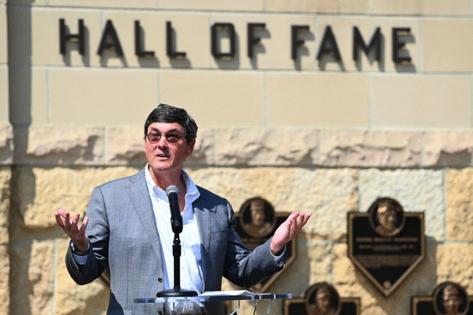Joe Starkey: Pirates are more culpable than Dodgers in MLB's payroll disparity farce
Published in Baseball
PITTSBURGH — Some of you might be burning over comments Major League Baseball commissioner Rob Manfred made Tuesday.
Speaking in Phoenix, Manfred addressed the grotesque financial inequities in his sport — namely, the Los Angeles Dodgers boasting a payroll of nearly $400 million, which is practically a decade of Pirate payrolls.
"They've gone out and done everything possible, always within the rules that currently exist, to put the best possible team on the field," Manfred said. "And I think that's great for the game."
It's really not great for the game. It's a joke. It has people wondering again if a salary cap will be included in the next collective bargaining agreement (the current one expires in 2026).
I doubt it will, with MLB rolling in revenues, even though the salary of a single Dodgers player, Shohei Ohtani, is roughly the same as the Pirates' entire payroll (even if Ohtani is deferring $68 million of his $70 million salary).
But that raises an honest question, as I look at the numbers from spotrac.com: Which payroll do you find more repulsive ...
A.) The Dodgers, at roughly $386 million.
B.) The Pirates, at roughly $71 million.
I'd go B by a long shot, for many reasons, including the fact that the Pirates and teams like them receive welfare payments, via luxury tax and revenue sharing, from teams like the Dodgers.
Where is that money going?
The Post-Gazette's Noah Hiles tells me that according to sources, the Pirates' projected payroll is actually around $83 million, still more than $4 million less than last season's. So the central point stands: At a time when the Pirates should be pumping payroll, they're going backward.
Three years ago, the Post-Gazette's Mark Belko reported that "the lion's share of the Pirates players' payroll in many years since 2007 has been covered by ticket and concession revenues — even before accounting for the millions that Pittsburgh's team collects from TV and Major League Baseball."
There is nothing more repulsive than not trying.
How is it possible that the Pirates and their billionaire owner are retreating on payroll?
How is that acceptable?
Have we been lied to?
The payroll was supposed to increase, not decrease, as the Pirates moved closer to actual contention. That's what we were told. This was Pirates general manager Ben Cherington back on Feb. 16, 2020, right after the big free agent signing of center fielder Jarrod Dyson (and by big, I mean small).
"I'm confident [payroll] will increase over time as we get deeper into our team build," Cherington told the Post-Gazette. "I'm confident we'll have the means to build a winning team and add pieces. We're not putting any kind of date on when that could happen. We're going to try and get there as soon as we can."
Like a kid on a lengthy road trip, speaking to his parents up front, I would ask, "Are we there yet?"
The Pirates' payroll actually did go up each year from 2020 through last season, but it basically started at nothing. So it's kind of like saying the kid's allowance went from a penny to nickel — and it hardly explains never getting close to 2017 levels and suddenly retreating in a year when the team should finally be pushing to win.
This wasn't the plan.
You'd think that this season, with the prospect of an excellent rotation featuring a generational talent in Paul Skenes, would see the Pirates raise the payroll at least to 2016 and '2017 levels, when they got close to $100 million.
But no. Bob Nutting tucked away the wallet again, leaving his minions to scour the couch cushions for quarters. That's how you get a spring training where the big storylines are about leadership and "winning in the margins."
And that's how you wind up with soon-to-be-37-year-old Tommy Pham manning left field and fading Adam Frazier as one of your many utility men.
This was former Post-Gazette columnist Bob Smizik on "X" when the Frazier move went down: "Hours after [the Pirates] affirmed their role as MLB laughingstock by signing Adam Frazier, the Reds signed Austin Hays, who is a much better outfield option. Only problem: Frazier signed for $1.5M; Hays signed for $5M. Apparently, $3.5M is a sum Pirates won't pay to improve the team."
Now compare that to Cherington, four years ago, in the aforementioned interview: "While I do believe that the total investment in baseball operations is really competitive, I also believe players deserve to be paid. And we need to pay them."
The Pirates still haven't signed a free agent to a multi-year deal in nearly a decade. Obviously, they can never be the Mets or Dodgers in this farce of a system, but they could surely spend as much as the Milwaukee Brewers in a like-sized market. Milwaukee manages to push well past $100 million each year.
It should really burn when you hear an owner like the Mets' Steve Cohen telling reporters Tuesday that he'd "blown through" the payroll budget this offseason.
Why?
"Because I want a winning team," Cohen said. "And I want to get the best team I can on the field."
Novel concept.
© 2025 the Pittsburgh Post-Gazette. Visit www.post-gazette.com. Distributed by Tribune Content Agency, LLC.







Comments